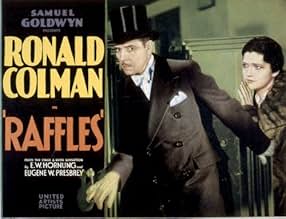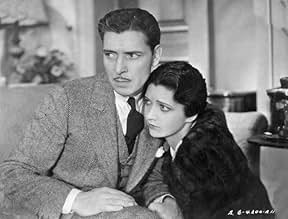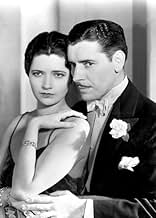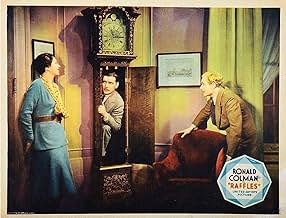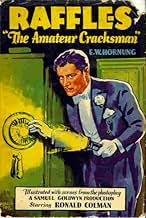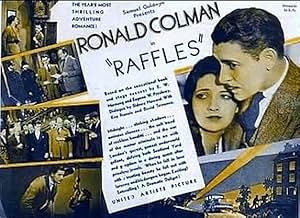Raffles
- 1930
- 1 h 12 min
Adicionar um enredo no seu idiomaA distinguished English gentleman has a secret life--he is the notorious jewel thief the press has dubbed "The Amateur Cracksman". When he meets a woman and falls in love he decides to "reti... Ler tudoA distinguished English gentleman has a secret life--he is the notorious jewel thief the press has dubbed "The Amateur Cracksman". When he meets a woman and falls in love he decides to "retire" from that life, but an old friend comes to him with a predicament that entails him com... Ler tudoA distinguished English gentleman has a secret life--he is the notorious jewel thief the press has dubbed "The Amateur Cracksman". When he meets a woman and falls in love he decides to "retire" from that life, but an old friend comes to him with a predicament that entails him committing one last job.
- Direção
- Roteiristas
- Artistas
- Indicado a 1 Oscar
- 2 vitórias e 1 indicação no total
- Lord Harry Melrose
- (as Frederic Kerr)
- Lord Melrose's Butler
- (não creditado)
- Harry - Lord & Lady Melrose's Friend
- (não creditado)
- Gwen's Friend
- (não creditado)
- Party Guest
- (não creditado)
- Direção
- Roteiristas
- Elenco e equipe completos
- Produção, bilheteria e muito mais no IMDbPro
Avaliações em destaque
"Raffles" is about a gentleman who is also an amateur thief--and a very talented one. While his society friends adore Raffles (played by Ronald Colman at his charming best) because of his wit, sporting skills and fine manners, they don't realize HE is this thief. Much of the film concerns his attending a particular weekend party in order to steal a necklace so he can use the money to help a friend in dire straits. However, along the way he meets up with a swanky lady (Kay Francis) and he's torn between his life of crime or becoming 100% legitimate for her sake. What will Raffles do? And what will Raffles do when ANOTHER crook shows up as well?! All in all, "Raffles" is a pleasant and a bit too talky film. Personally, I think it would have been better with more outdoor scenes and action. But again, 1930 was still a transitional year for sound and the stagy production was pretty typical. I also thought Raffles' 'brilliant' escape at the end was anything but. However,the acting was good and it was nice to see a detective who was NOT stupid (a common and rather dumb cliché of the 1930s and 40s). Well worth seeing but not among Colman's best work.
Raffles is a British gentleman who supports himself by being a jewel thief - an amateur cracksman. The film opens with his burglary of a jewelry store with him leaving a calling card saying that this is his final burglary. He's fallen in love with Gwen (Kay Francis) and plans to leave this life behind because of his love for her. But then his friend Bunny appears, literally suicidal, and says he has written a bad check of one thousand pounds for gambling debts. His reputation will be ruined when the bank opens Monday morning and the check is known to be bad. So Raffles must pull one more job to help out his friend since he gave the jewelry in his last robbery to Gwen. He eyes the jewels of Lady Melrose as doing the job. Plus Bunny already has an invitation to go to the Melrose estate for the weekend for a big gathering that is going on there, so Raffles asks Bunny if he can go along. Realize that Raffles' criminal activity is a secret from everyone at this point - friends, family, servants.
But there are complications. Scotland Yard sends an inspector to the Melrose estate along with a cadre of cops because Scotland Yard thinks that the Amateur Cracksman will strike there that weekend. Also, there is a gang of burglars planning to steal the Melrose jewels themselves, under the cover of darkness. Then Gwen decides to pay a surprise visit to the Melrose estate, further complicating Raffles' plans to steal Lady Melrose's jewels.
I really can't say anymore without spoiling the fun for other viewers, but considering it is a very early talkie it is amazingly fluid and quite good at delivering suspense and comedy. Particularly amusing is Alison Skipworth as Lady Melrose. In her 50s, Melrose's heart still skips a beat around Raffles on who she obviously has a crush to the point that she talks about him in her sleep.
Dashing Ronald Coleman was unusual among silent cinema leading men in that his popularity was not diminished by the coming of sound. Many other leading men lost their popularity and their careers simply because they did not sound like what audiences expected. Colman had no such problem and with his excellent voice he was a natural with dialog. Watch this one and see what I mean. It delivers a great story well told, does not outstay its welcome, and supplies just the right amount of dialog.
Raffles is a celebrated cricket player and as such has entrée into all the proper British upper class homes of the between the two World Wars period. He also has an interesting sidelight as a thief, in his own way, admired even by the police for his skill at his craft as Cary Grant in To Catch A Thief.
Colman has made up his mind to steal a valuable necklace from Alison Skipworth, but a rather nasty complication sets in in the person of Bramwell Fletcher a friend who seems to have written a check for far more funds than he has. Fletcher attempts suicide at Colman's apartment and Colman says he'll help.
In this very short, barely over 70 minute feature film, Colman has the unusual task of, accomplishing his objective in stealing the necklace, avoid detection by the police in the person of amiable Scotland Yard Inspector David Torrence, help poor Fletcher out with his problem, and last, but certainly not least win the love of long time girl friend, Kay Francis.
In a very cleverly written script Colman does accomplish nearly all, but the strength of Raffles is the telling of the tale of how he managed it all. Let's say that Colman is one clever guy who thinks very fast on his feet.
Despite the well chosen supporting cast by Sam Goldwyn, Raffles is a film held together by the charm and personality of Ronald Colman. Much the same way as the 1939 version of Raffles that Goldwyn did is held together by David Niven.
And if you're a Ronald Colman fan who like I could listen to him recite the Erie County Phone Directory, than Raffles is an absolute must for you.
Raffles the English gentleman has a discreet sideline as a burglar and jewel thief. The press has dubbed him 'The Amateur Cracksman', and as such he has become a household name. Now that he has fallen in love with the sophisticated Gwen (Kay Francis) and proposed marriage to her, Raffles has decided to retire from crime. However, his old pal Bunny is in a spot of bother. Bunny has been playing cards again, and has run up a gambling debt of £1,000. If Bunny is to be rescued from his predicament, Raffles will have to take on the Melrose 'job' ...
Ronald Coleman gives us his trademark suave Englishman in the title role. We see him burgling a jeweller's shop wearing a top hat (note the excellent Toland touch of the policeman silhouetted against the window drape). Our first real glimpse of the hero comes on the dance floor as he sweeps Gwen around in a romantic waltz. On the cricket field at Lord Melrose's place, Raffles is of course dashing, and wins the game (even though he was not supposed to be playing - he invited himself along for the weekend at the last minute). Even when Inspector Mackenzie has him on the ropes, Raffles remains the epitome of poise and wit.
"All bubbles and froth - no taste," says Lord Melrose, giving his verdict on champagne. It is a reasonable comment on the film itself, which for all its pretensions to style is basically an inelaborate crime flick. We have the 'two Englands' crudely juxtaposed - one urban and ugly (the cloth-capped burglars from the pub, the 'pea soup' fog in London) and the other bucolic and 'refayned' (Lady Melrose's soiree). The film takes it for granted that the lower classes are unpleasant.
However, there are good things in this movie. The cricket match is fun, and tolerably well done, though Raffles' bowling action is highly dubious and the umpire's position would make lbw decisions interesting to say the least. The skylight scene on Raffles' apartment roof is an arresting image.
There is also a large portion of baloney. Does Scotland Yard protect country houses against burglary? Is this best done by surrounding them with a dozen detectives throughout the night? Why don't these detectives catch the various burglars who enter the premises? If closing the sash window is enough to stop the burglar alarm from ringing, then it isn't much of a burglar alarm. The 'common' burglars crouch in the shrubbery and talk aloud, spelling out their plans in pedantic detail, conveniently allowing Raffles to overhear. Is it not slightly more probable that they would have worked out what to do before entering the property?
The film ends in a flurry of increasingly silly activity. Blatant undercranking of the camera makes Raffles' escape dash look ridiculous, and his place of concealment is laughable.
Verdict - An enjoyable crime caper with absurd elements.
Raffles has been a reformed ex-Cracksman for a few hours but finds he suddenly has to help his limp friend Bunny repay £1000 within 2 days and he only knows one way to get it. An invite to Lady Melrose's country house for cricket and a garden party of hundreds provides him with the chance and also a gang of six ineffectual Cockney burglars who skulk around in the dark loudly laying their plans. The scene where the burglar is caught and venomously points out Raffles on the stairs is pivotal to the film but it never recovers from the clumsy handling of it did Colman know what to say at that point? Colman was great in the role, his clipped accent and perfect diction usually used to good effect. Good support was from Kay Francis who played his understanding girlfriend although she didn't get to say Divine, and David Torrence the chunky and heavily cloaked Scotland Yard Inspector. Favourite bit: the torchlit confrontation between Raffles and Crawshay in the bedroom at midnight.
Simple old fashioned entertainment - I stick it on every few years without fail because with all its faults I like this one.
Você sabia?
- CuriosidadesThe last Samuel Goldwyn movie to be shot simultaneously in silent and talkie versions.
- Erros de gravaçãoWhen the alarm goes off and the cat burglar is attempting to escape, Bunny's bedroom windows are show to be wide open, which would have prevented the alarm being set in the first place.
- Citações
Inspector McKenzie: Good heavens! In the tobacco! Well, I'll be...
A.J. Raffles: Yes, I thought that you would be.
- Versões alternativasRaffles (1930) was made simultaneously in silent and talking versions. With almost all the theaters in the USA wired for sound, this was to be the last film that Samuel Goldwyn produced in this manner.
- ConexõesReferenced in O Diabo é um Poltrão (1936)
- Trilhas sonorasThe Blue Danube
(uncredited)
Written by Johann Strauss
Heard when Raffles takes Lady Melrose to her room.
Principais escolhas
- How long is Raffles?Fornecido pela Alexa
Detalhes
- Data de lançamento
- País de origem
- Idioma
- Também conhecido como
- Herr Raffles gör visit
- Locações de filme
- Empresa de produção
- Consulte mais créditos da empresa na IMDbPro
Bilheteria
- Faturamento bruto nos EUA e Canadá
- US$ 1.000.000
- Tempo de duração1 hora 12 minutos
- Cor
- Mixagem de som
- Proporção
- 1.20 : 1
Contribua para esta página


